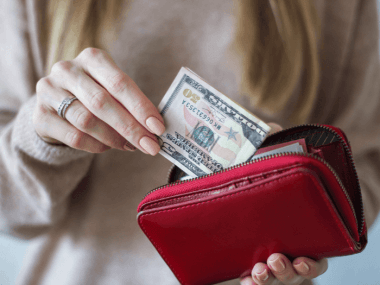10 Things Student Loan Borrowers Should Know About Coronavirus Relief
The CARES Act includes broad relief for hardships created by the COVID-19 pandemic, including significant benefits for student loan borrowers. Laura answers questions about the relief and explains what it is, who can use it, and how it impacts your future of your student loan repayment.
The Coronavirus Aid, Relief, and Economic Security (CARES) Act became law on March 27, 2020. It includes broad relief for hardships created by the COVID-19 pandemic, including significant benefits for Americans paying off student loans.
In this post, we’ll cover what the coronavirus relief is, who can use it, and how it impacts the future of your student loan repayment. I’ll also answer the following questions from Money Girl readers and podcast listeners about paying their loans.
Maria B. says:
I have a $240,000 federal consolidated student loan that’s in the 20-year forgiveness program. But I won’t be able to pay off the loan before the 20-year term ends. Now that the loan is in forbearance due to coronavirus, should I opt out and continue paying it down or use the money for something else?
Rebecca says:
I want to thank you for your helpful podcast and tips. Although this is a tough time, I’m saving more than if I were eating out and purchasing coffees. How do you recommend I handle my federal student loans during this pandemic?
Thanks for your great questions, Maria and Rebecca! I’ll answer them as we review 10 things borrowers should know about coronavirus student loan relief.
Here’s the detail about primary benefits the CARES Act gives most people who are paying off student loans.
1. Most student loan payments are in forbearance
Starting on March 13, 2020, most student loans will be on automatic forbearance until September 30, 2020. That means you can temporarily stop making your monthly student loan payments for about six months.
If you have autopay set up to draft monthly loan payments from your bank account, it should stop and restart without you having to do anything. But keep an eye on your account to make sure you know exactly when your last loan payment occurs.
Most student loans will be on automatic forbearance until September 30, 2020. That means you can temporarily stop making your monthly student loan payments for about six months.
If you make student loan payments manually, set a calendar reminder so you won’t forget about the suspension expiration after September 30. Your loan servicer should contact you no later than in August to remind you when your payment is due. So, make sure your contact information is up to date with your lenders.
2. Student loan forbearance is retroactive
If your student loan payment was already drafted from your bank account or you sent payment for March or April, be aware that the forbearance is retroactive. That means any payments made between March 13 and September 30 can be returned to you; however, you’ll need to contact the company that services your loan to request a refund.
The institutions that service federal loans are working to catch up, and it may take several weeks for them to update their websites, process payments, and adjust electronic transfers. If you call your loan servicer and can’t get through, just keep trying. They’re likely overwhelmed with millions of borrower accounts that must be changed right now.
3. Student loan interest doesn’t accrue during forbearance
If you’re worried that skipping student loan payments means that interest will still accrue, you’re in luck. During the automatic forbearance, qualifying loans won’t have any additional interest added to balances.
Even if you have federal student loans that are in default because you haven’t made payments, 0% interest will apply during the suspension period.
4. Not all student loans qualify for forbearance
Unfortunately, not every type of student loan qualifies for the administrative forbearance because not all loans are owned by the federal government. The following loan types are covered under the CARES Act:
- Direct Loans that are unsubsidized or subsidized
- Direct PLUS Loans
- Direct Consolidation Loans
- Federal Family Education Loans (FFEL)
- Federal Perkins Loans
But if you have FFEL loans owned by a private lender or Perkins loans held by the education institution you attended, they won’t receive automatic forbearance. If you’re not sure what type of student loan you have, use the National Student Loan Data System or contact your loan servicer.
5. Consolidation may qualify you for forbearance
If you have an FFEL or Perkins loan that doesn’t qualify for forbearance, you may have the option to consolidate it into a Direct Loan, which would be eligible. The problem is, after the suspension expires, the interest rate may end up being higher than what you’re currently paying.
Speak with your loan servicer about the pros and cons of consolidating a non-qualifying loan to take advantage of the no-payment and no-interest suspension period.
6. Some private student loan lenders may offer relief
If you have student loans held by private companies or educational institutions, they may offer relief if you request it. For instance, some student loan servicers are giving borrowers in good standing who are experiencing a financial hardship forbearance for 60 or 90 days.
If you have both federal and private loans and are struggling to keep up your payments, make your private loans the priority while your qualifying federal loans are in automatic forbearance.
However, interest is likely to accrue on private loans during a suspension. So, if you have both federal and private loans and are struggling to keep up your payments, make your private loans the priority while your qualifying federal loans are in automatic forbearance. This strategy will keep your interest expense as low as possible and protect your credit.
7. Skipped student loan payments don’t negatively affect your credit
Speaking of credit, skipping payments from March 13 through September 30 on qualifying federal student loans will not hurt your credit. The suspended payments will be reported to the credit bureaus as if you paid them on time.
8. Suspended student loan payments count as if you paid them
Many student loan borrowers may be worried that skipping payments during the automatic forbearance means they’ll get behind on repayment or forgiveness plans. Maria B. brought up this concern because she has a large amount of debt in the 20-year forgiveness program. The good news is that suspended payments count toward these plans, and you won’t lose any time.
Since suspended payments count toward loan forgiveness, any payments you make during the forbearance period will reduce the amount you eventually have forgiven. So, it’s in your best interest not to continue paying student loans that qualify for any forgiveness.
Since suspended payments count toward loan forgiveness, any payments you make during the forbearance period will reduce the amount you eventually have forgiven. So, it’s in your best interest not to continue paying student loans that qualify for any forgiveness. You’ll be better off using the potential loan payment for something else, such as shoring up your emergency fund.
9. Garnishments on student loans in default are suspended
If you struggled to make your student loan payments, even before the coronavirus, and are in collections, you’re also eligible for relief. Collectors must stop contacting past due borrowers during the forbearance period.
Garnishment of your wages, tax refund, Social Security, or other federal benefits to collect past due student loans must also stop until September 30. If you had a garnishment after March 13, you would get it back. You might need to contact your employer’s payroll department if your wages were garnished since then.
10. Student loan forbearance is optional
If you want to continue making student loan payments during the suspension period, you can. Rebecca mentioned that she’s saving more money than usual, and it sounds like her income isn’t in jeopardy. That’s a great position to be in!
If you can afford it, and your loan isn’t in a forgiveness program, continuing payments can help you get ahead. With 0% interest, the amount you pay will get applied to your principal loan balance, which enables you to get out of debt faster. To opt-out of forbearance, contact your loan servicer to reinstate your autopay or continue to send manual payments.
If you have questions about the new student loan regulations or need advice about managing yours, be sure to speak to a representative from your servicing company. They can help you understand your options and how to make your loans as affordable as possible.






